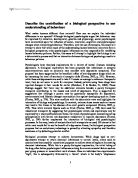Is Behaviour Learnt or Innate? Whether our behaviour, actions and conduct are determined by nature, the genes given to us by our parents or by nurture,
Question: Is Behaviour Learnt or Innate?
Whether our behaviour, actions and conduct are determined by nature, the genes given to us by our parents or by nurture, the factors of the environment upon us after birth and through childhood is a debate that has fascinated psychologists throughout history. Starting with Galton’s study of Darwin’s book on evolution and carrying on with other famous Psychologists such as Pavlov, Watson and Skinner, this is an area of study that is both popular and important.
There has been no definitive correct answer to the debate of nature versus nurture and so there are still differing views. Some views have differed in the extreme. For example Galton (1883) suggested “nature prevails enormously over nurture” yet Eysenck (2003) reports John Locke arguing “They (Babies) are born with a mind that is like a blank slate (tabula rasa) and experience records itself in such a way that each individual becomes a unique being. We inherit nothing and all behaviour is acquired as a consequence of experience.”
It is a very difficult question to answer because it is almost impossible to ascertain whether someone’s actions are due to genes or environment. One method used to try and determine whether genes are the most important factor are with identical twin studies. If two monozygotic twins have the same characteristics as each other then it suggests that genes are causing this effect. There are however flaws with this reasoning as twins generally experience the same environment e.g. parents, friends, school etc so it could be argued that the similarities are down to this. A perfect study would be identical twins separated at birth who have experienced completely different environments. Unfortunately this case study is hard to come by and so no real proof can be gained from this.







